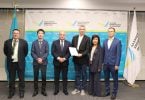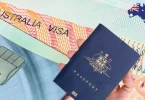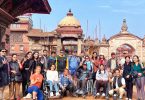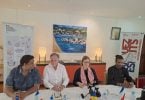Services Available by Locale
Reproductive treatments can include in vitro fertilization (IVF) treatment with gamete (a mature sexual reproductive cell, as a sperm or egg, that unites with another cell to form a new organism) donation can be accessed in many parts of the world; however, in Spain, Denmark, and the Czech Republic gamete donation is strictly anonymous. In some countries (i.e., Germany, Italy, Norway, Austria and Switzerland)) egg donations are prohibited.
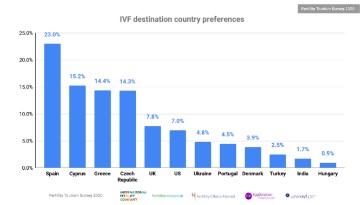
Spain
Forty percent of European travelers searching for fertility treatments select Spain for medical facilities, encouraged by the law that allows treatments of single women and anonymity for donors. In 2016, 138,553 IVF cycles and 38,463 artificial inseminations were performed in approximately 307 public and private clinics. Many of the foreign travelers came from France and Italy visiting the country because of the more favorable laws and high-quality treatments. According to the IDIS Foundation “Spain is the leading European nation for Assisted Human Reproduction in number of clinics and cycles…Fertility tourism is growing in popularity.”
Denmark
Many of the children in Denmark are born through IVF or donor sperm resulting in the country leading the world in the use of Assisted Reproductive Technology (ART) to build families (estimated 10 percent of all births involved these techniques). Many Danish women, failing to find a suitable or interested partner to father their children have decided to go it alone choosing to become pregnant when they want to.
Denmark is an important destination for fertility services for single women, lesbians, and heterosexual couples as well as women/couples from Sweden, Norway, Germany, Italy, France, Ireland, Austria, New Zealand, and the UK seeking donated sperm.
It is interesting to note that infertile Danish women as well as heterosexual couples leave Denmark and travel to Spain and the Czech Republic, the Ukraine and Greece for donated eggs because of age and/or age restrictions.
Czech Republic
The Czech Republic offers low costs (as low as US $2,968) for IVF and egg donation (US $4,512) at over 43 clinics. The Czech Ministry of Health report on assisted reproductive technology found that more than a quarter of IVF cycles and nearly 90 percent of donated egg transfers were performed on foreigners. The liberal national legislation allows genetic screening and egg donation which is not true in some European countries.
Amy Speier, a medical anthropologist at the University of Texas Arlington who has studied reproductive tourism in the Czech Republic, found that people searching for “white” children will “…chose the Czech Republic over Spain because they imagine Spain only has Brown babies, which is totally wrong” (undark.org).
Belgium
In Belgium policies concerning assisted reproduction differ between secular and catholic hospitals. Patients who fear (or know) that they will not be accepted in a catholic clinic request medical assistance in a fertility center with a different moral viewpoint even it this means traveling to another city or another country.
Israel
Reproduction is an important market segment for Israel tourism, offering more than three decades of major technology in the assisted reproduction industry. In Israel a cycle of private treatment runs between $6,000-$7,000. In Israel the system really wants you to have a baby – and it is offered free to citizens and at a relatively low cost to private patients.
United States
People travel to the USA for surrogacy procedures because of the availability of high-quality medical technology plus legal protections to surrogacy via contract. Increasingly, same-sex couples facing restrictions using IVF and surrogacy procedures in their home countries travel to the US where it is legal. It is also a selected destination for surrogate mothers by couples seeking a green card in the US since the resulting child can get birthright citizenship in the US and can apply for a green card for the parents when the child turns 21 years of age.
Mexico
Cross-border fertilization has become increasingly important to the Mexican economy and its success can be attributed to its liberal ART and egg donation policies. The destination features over 50 clinics that use assisted reproductive technology. Mexico does not have legal regulations that restrict or prohibit IVF or egg donations in their clinics, making it a preferred destination for infertility treatment for people living in the United States.
Canada
Almost half the babies born to Canadian surrogates in British Columbia (2016, 2017) were born to foreign parents. The country is one of the few destinations that allows surrogacy for foreign commissioning parents and does not discriminate on the basis of marital status or sexual orientation. It is considered fairly efficient in granting legal parental rights, declaring legal parenthood and issuing birth certificates within weeks of birth. In addition, its strong and universal healthcare system makes it a favorable international surrogacy destination as pregnant women in Canada receive high-quality publicly funded healthcare throughout pregnancy, during delivery and after birth reducing the risk of pregnancy complications which are often a significant concern of commissioning parents.
Greece
Greece benefits economically from fertility tourism as approximately one thousand women head to Greece each year for assisted reproduction. There are more than 60 facilities in Greece with special ART units. Additional checks and balances in Greece are placed on the producers by the Greek National Authority for Assisted Reproduction (GNAA). The Authority is a national body that introduces and controls the scientific, legal and moral framework in which all clinics and organizations related to assisted reproduction are functioning.



